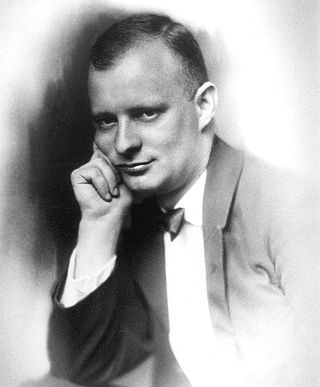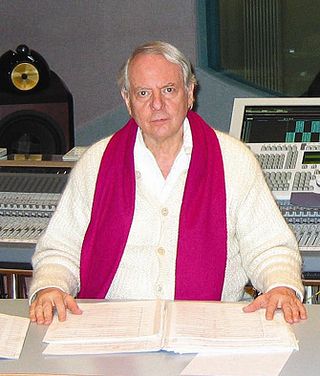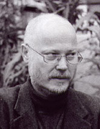Related Research Articles

Paul Hindemith was a German and American composer, music theorist, teacher, violist and conductor. He founded the Amar Quartet in 1921, touring extensively in Europe. As a composer, he became a major advocate of the Neue Sachlichkeit style of music in the 1920s, with compositions such as Kammermusik, including works with viola and viola d'amore as solo instruments in a neo-Bachian spirit. Other notable compositions include his song cycle Das Marienleben (1923), Der Schwanendreher for viola and orchestra (1935), the opera Mathis der Maler (1938), the Symphonic Metamorphosis of Themes by Carl Maria von Weber (1943), and the oratorio When Lilacs Last in the Dooryard Bloom'd (1946), a requiem based on Walt Whitman's poem. Hindemith and his wife emigrated to Switzerland and the United States ahead of World War II, after worsening difficulties with the Nazi German regime. In his later years, he conducted and recorded much of his own music.

Gesang der Jünglinge is an electronic music work by Karlheinz Stockhausen. It was realized in 1955–56 at the Westdeutscher Rundfunk studio in Cologne and is Work Number 8 in the composer's catalog. The vocal parts were supplied by 12-year-old Josef Protschka. It is exactly 13 minutes, 14 seconds long.

Inori, for one or two soloists with orchestra, is a composition by Karlheinz Stockhausen, written in 1973–74.

Aribert Reimann was a German composer, pianist, and accompanist, known especially for his literary operas. His version of Shakespeare's King Lear, the opera Lear, was written at the suggestion of Dietrich Fischer-Dieskau, who performed the title role. His opera Medea after Grillparzer's play premiered in 2010 at the Vienna State Opera. He was a professor of contemporary Lied in Hamburg and Berlin. In 2011, he was awarded the Ernst von Siemens Music Prize for his life's work.

Leonid Kreutzer was a classical pianist.
New Simplicity was a stylistic tendency amongst some of the younger generation of German composers in the late 1970s and early 1980s, reacting against not only the European avant garde of the 1950s and 1960s, but also against the broader tendency toward objectivity found from the beginning of the twentieth century. Alternative terms sometimes used for this movement are "Inclusive Composition", "New Subjectivity", "New Inwardness", "New Romanticism", "New Sensuality", "New Expressivity", "New Classicism", and "New Tonality" (neotonality).

Neues vom Tage is a comic opera in three parts by Paul Hindemith, with a German libretto by Marcellus Schiffer.
Prozession (Procession), for tamtam, viola, electronium, piano, microphones, filters, and potentiometers, is a composition by Karlheinz Stockhausen, written in 1967. It is Number 23 in the catalogue of the composer's works.

Ouvertüre zum „Fliegenden Holländer“, wie sie eine schlechte Kurkapelle morgens um 7 am Brunnen vom Blatt spielt is a musical parody for string quartet by Paul Hindemith, based on the overture to The Flying Dutchman by Richard Wagner. The piece dates to c. 1925 and in performance lasts approximately eight minutes.
Stephen Hinton is a British-American musicologist at Stanford University. A leading authority on the composer Kurt Weill, he has published widely on many aspects of modern German music history, with contributions to publications such as Handwörterbuch der musikalischen Terminologie, The New Grove Dictionary of Opera, The New Grove Dictionary of Music and Musicians, Die Musik in Geschichte und Gegenwart, and Funkkolleg Musikgeschichte. His most recent book, Weill's Musical Theater: Stages of Reform, the first musicological study of Weill's complete stage works, received the 2013 Kurt Weill Book Prize for outstanding scholarship in music theater since 1900. The reviewer for the Journal of the American Musicological Society described the book as "a landmark in the literature on twentieth-century musical theater."

Bernhard R. Appel is a German musicologist. His research focuses on the life and work of the composer Robert Schumann, music history of the 18th and 19th centuries, Ludwig van Beethoven's works, compositional creative processes as well as methodology, theory and practice of music philology, in particular genetic textual criticism and digital music edition. In addition, Appel deals with the history of the viola da gamba.
Albrecht Riethmüller is a German musicologist.
Wolfgang Rathert is a German musicologist.
Andres Briner was a Swiss music historian, academic and art journalist
Christian Martin Schmidt was a German musicologist and music theorist.

Dieter Rexroth was a German musicologist, dramaturge and cultural manager. He was intendant of the Deutsches Symphonie-Orchester Berlin from 1996, responsible also for choirs and orchestras in Berlin. He worked for major festivals including Frankfurter Feste at the Alte Oper, Young Euro Classic in Berlin and the Kasseler Musiktage. He wrote or edited books about composers including Paul Hindemith, Hans Werner Henze and Wolfgang Rihm.
Susanne Fontaine is a German musicologist and university teacher.
Hermann Danuser is a Swiss-German musicologist.
Gerd Rienäcker was a German musicologist.
Karl Johannes Max Strub was a German violin virtuoso and eminent violin pedagogue. He gained a Europe-wide reputation during his 36 years of activity as primarius of the Strub Quartet. Stations as concertmaster led him from the 1920s to the operas of Stuttgart, Dresden and Berlin. Appointed Germany's youngest music professor at the Hochschule für Musik Franz Liszt, Weimar in 1926, he followed calls to the Berlin University of the Arts and, after the Second World War to the Hochschule für Musik Detmold. Strub was a connoisseur of the classical-romantic repertoire, but also devoted himself to modern music, among others he gave the world premiere of Hindemith's Violin Sonata No. 2 in D major. He promoted the music of Hans Pfitzner. Strub played on a Stradivari violin until 1945; numerous recordings from the 1930s/40s document his work.